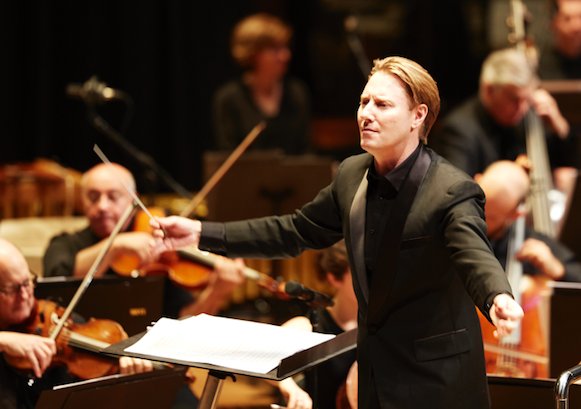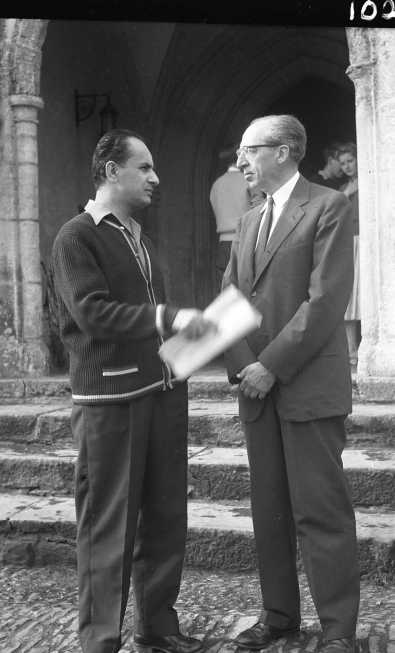 A fantastic Sydney Symphony concert this afternoon. Benjamin Northey conducted the band in Andrew Ford’s Headlong, followed by Rachmaninoff’s Piano Concerto No. 4, with Simon Tedeschi as soloist, and Aaron Copland’s Symphony No. 3 to finish.
A fantastic Sydney Symphony concert this afternoon. Benjamin Northey conducted the band in Andrew Ford’s Headlong, followed by Rachmaninoff’s Piano Concerto No. 4, with Simon Tedeschi as soloist, and Aaron Copland’s Symphony No. 3 to finish.
You don’t hear these pieces often. The Rach is a monster to play (not that Simon Tedeschi seemed to have any problems…). The Copland is huge and complex and requires virtuoso performances from every corner of the stage. And Headlong is by an Australian composer not called Percy Grainger, which is a tough place to start. Add to that its scoring, for basically everything in the box, including celesta, harp and kitchen cabinet of percussion, and the fact that the composer, Andrew Ford, pulls no punches in terms of what he expects of the players, creating a real concerto for orchestra. The SSO more than rise to the occasion, of course, but it’s not the sort of piece you could sneak into any program on a whim.
It’s also not, in my opinion, Ford’s most successful work. Not yet, at least. In his program note he explains how it has changed since its first outing, in 2007, introducing more space and a flamboyant but intricate final bar (which instantly, and delightfully, set off my Rite of Spring sensors). There is still, however, a level of opacity to the work which doesn’t fit with my sense of Ford as a subtle and insightful arch-communicator. It feels like there’s all this stuff in the texture which wants to be heard, but isn’t.
I’d never heard Rachmaninov’s Piano Concerto No. 4 performed live before and it was a fascinating experience, not just for the eye-wateringly tricky solo, but also for the way that the music forms a seamless continuum with the rest of Rachmaninov’s work. The first movement begins in media res, as if picking up from where the previous concertos left off, and there are constant wisps of melody that seem vaguely familiar. Is it possible to generate the feeling of nostalgia, without the knowledge of what one is nostalgic for?
Out of the crashing waves of melodic energy the soloist emerged not as the triumphant hero but as someone very much at one with his surroundings — far more part of the orchestra, a fellow musician, than the flashy virtuoso. A heroic anti-hero, if you like. Tedeschi’s legato is astonishing (and achieved with minimal pedal, it looked like) – giving Rachmaninov’s music a diamond-cut clarity, sorting out the themes from the nutty mountain of notes.
 While the piano was being moved for the Rachmaninov conductor Ben Northey gave the audience a few insights into the final work, Aaron Copland’s Third Symphony. This is the one that builds up to and integrates his previous work, Fanfare for the Common Man, in its blazing last movement. Northey pointed out that this passage appears at first as a passacaglia in the flutes, rather than a declamation in the brass (and you can hear the bones of the chord progression forming in the first movement too…) The point being, that this is not intended as a bombastic work, and far less a nationalist one, even though it has been dubbed the Great American Symphony. It’s stirring, it’s noble, but we needn’t conflate high ideals with a particular nation. Hence the concert’s subtitle, Symphony for a Common Man.
While the piano was being moved for the Rachmaninov conductor Ben Northey gave the audience a few insights into the final work, Aaron Copland’s Third Symphony. This is the one that builds up to and integrates his previous work, Fanfare for the Common Man, in its blazing last movement. Northey pointed out that this passage appears at first as a passacaglia in the flutes, rather than a declamation in the brass (and you can hear the bones of the chord progression forming in the first movement too…) The point being, that this is not intended as a bombastic work, and far less a nationalist one, even though it has been dubbed the Great American Symphony. It’s stirring, it’s noble, but we needn’t conflate high ideals with a particular nation. Hence the concert’s subtitle, Symphony for a Common Man.
Well said, Ben. And well played, SSO. Big music for big ideas, and a huge orchestra, held together by the finest of threads, all knitted together by Northey. Many soloists deserve a shout out — Ben Jacks and Rosemary Plummer in particular were outstanding — but in truth, this was the ultimate Concerto for Orchestra.
The black and white photo above is taken by Catherine Scudamore and is part of the Summer School Archive. It shows Aaron Copland (r) and Manoug Parikian (l) in front of the steps to the Great Hall at Dartington in 1968. You can see more of the archive by pledging to buy my book, Sanctuary. Do take a look!
.

March 20, 2017 at 1:33 am
Nice photo… 🙂